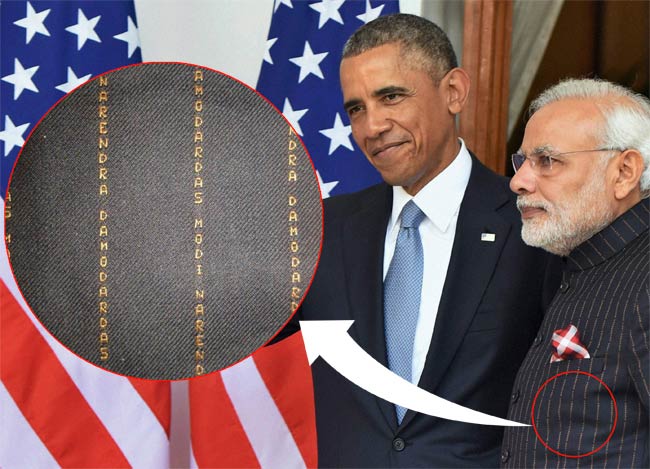Indian PM Modi Wears Suit Embroidered With His Own Name to Greet U.S. President Obama

Formerly banned from entry to U.S., Modi is tied to genocide and nicknamed “Butcher of Gujarat”
NEW DELHI: Feb. 5, 2015 – In his first public appearance alongside Barack Obama after the U.S. president’s arrival in New Delhi, Indian PM Narendra Modi wore a suit embroidered with his own name, prompting some to identify the fashion choice as evidence of self-promotion.
“Maharajah Modi makes very obvious who he thinks is the most glorious person in the world,” commented Bhajan Singh, Founding Director of Organization for Minorities of India. “These are precisely the tactics used to sway multitudes of destitute people searching for a savior. Modi prides himself on his ability to mesmerize his frenzied followers to do anything — even the most obscene acts of violence. No wonder he is so pleased with himself after having surmounted a ten-year ban on entry to the United States thanks to his state-sponsored slaughter of Muslims when he was Chief Minister of Gujarat. Now he will let nothing — no lives, no liberty, no humility — stand in the way of maniacal pursuit of his self-promotional agenda.”
In 2005, Modi was banned by the U.S. State Department from entering the country due to “egregious religious freedom violations.” Commenting on the ban, then U.S. Ambassador to India David Mulford stated:
“It is based on the fact that, as head of the State government in Gujarat between February 2002 and May 2002, he was responsible for the performance of state institutions at that time. The State Department’s detailed views on this matter are included in its annual Country Reports on Human Rights Practices and the International Religious Freedom Report. Both reports document the violence in Gujarat from February 2002 to May 2002 and cite the Indian National Human Rights Commission report, which states there was ‘a comprehensive failure on the part of the state government to control the persistent violation of rights of life, liberty, equality, and dignity of the people of the state.’”
Modi was Chief Minister of the Indian State of Gujarat from 2001 to 2014. In his first year of office, a three-day pogrom against Muslims took place in Ahmedabad, Gujarat’s largest city. Mobs armed with addresses of businesses and residences owned by Gujarat’s Muslim minority systematically eliminated Muslims. Human Rights Watch reported that nearly 2,000 Muslims were massacred by Hindu mobs and over 150,000 displaced.
A CNN affiliate reported in 2007 that several leaders of the BJP, Modi’s party, as well as the VHP, a rightwing social organization linked to the BJP, were told by Modi “to do whatever they wanted for three days.” Some of the officials who were caught on secret camera admitting to their roles in organizing the pogrom under Modi’s encouragement included Gujarat Shiv Sena President Babu Bajrangi, Godhra BJP MLA Haresh Bhatt, VHP convenor for Sabarkantha district Dhabal Patel and Gulbarg Society massacre accused Madan Dhanraj Chawal.
The U.S. blacklisting of Modi was swiftly reversed after his election as India’s chief executive. He was soon invited to visit the U.S. by leading politicians like Indian-American Congressman Ami Bera, a congressional representative of Gujarati origin who shares the prime minister’s native language. In late September, as Modi was lauded in New York City and Washington, D.C., Human Rights Watch reported:
“An enormous atrocity is hanging over the visit: the extensive communal violence in Gujarat in 2002, when Prime Minister Modi was chief minister of the state.… Human Rights Watch found extensive evidence of complicity by government officials through both acts and omissions. Modi’s government in Gujarat never investigated or prosecuted alleged human rights violations. It was only through intervention by India’s National Human Rights Commission, the Supreme Court, and local activists and victim groups that charges were filed; and prosecutors were able eventually to secure convictions for over 100 people, including a member of Modi’s cabinet.”
Despite Modi’s links to the 2002 violence, described as a “genocide against Muslims” by OFMI, Obama used the September 2014 visit to eagerly discuss sale of several billion dollars worth of arms, increased joint security-forces operations, and investment deals with multinational corporations like Boeing, Google, and PepsiCo. Upon visiting India just four months later, Obama became the only sitting president to ever travel to the country twice. As he presided over India’s 2015 Republic Day celebrations, Obama also reached an agreement to sell U.S. nuclear power plants, materials, and technology to a country that still refuses to sign the Nuclear Nonproliferation Treaty (to which even Iran is a signatory).
The Indian State has a pattern of promoting politicians for sponsoring anti-minority violence, says Pieter Friedrich, an analyst of South Asian affairs who remarked: “For ten years, India had a PM like the turban-wearing Manmohan Singh, who appointed as his NRI Minister Jagdish Tytler, a name of terror to the turban-wearing Sikh people because of how, as a member of parliament, Tytler led mobs through the streets of Delhi to butcher Sikhs in 1984. His role in the 1984 Sikh Genocide is widely reported. Now the Indian State is led by a PM like Narendra Modi, so that instead of a prime minister who merely coddles killers of minorities, there is one who is actually himself an architect of genocide.”
Friedrich notes that none of the politicians accused of organizing or participating in the 1984 genocide have gone to prison. “As Prime Minister, Manmohan Singh offered an apology to Sikhs for the 1984 genocide, which, as a Sikh, was not his fault,” says Friedrich. “Now, as India’s new Prime Minister, Modi, the Butcher of Gujarat, offered 500,000 rupees — around $13,000 – for each Sikh killed in the violence. Yet besides buying off the slaughter of priceless loved ones, the State has never offered a sincere solution: justice.”
